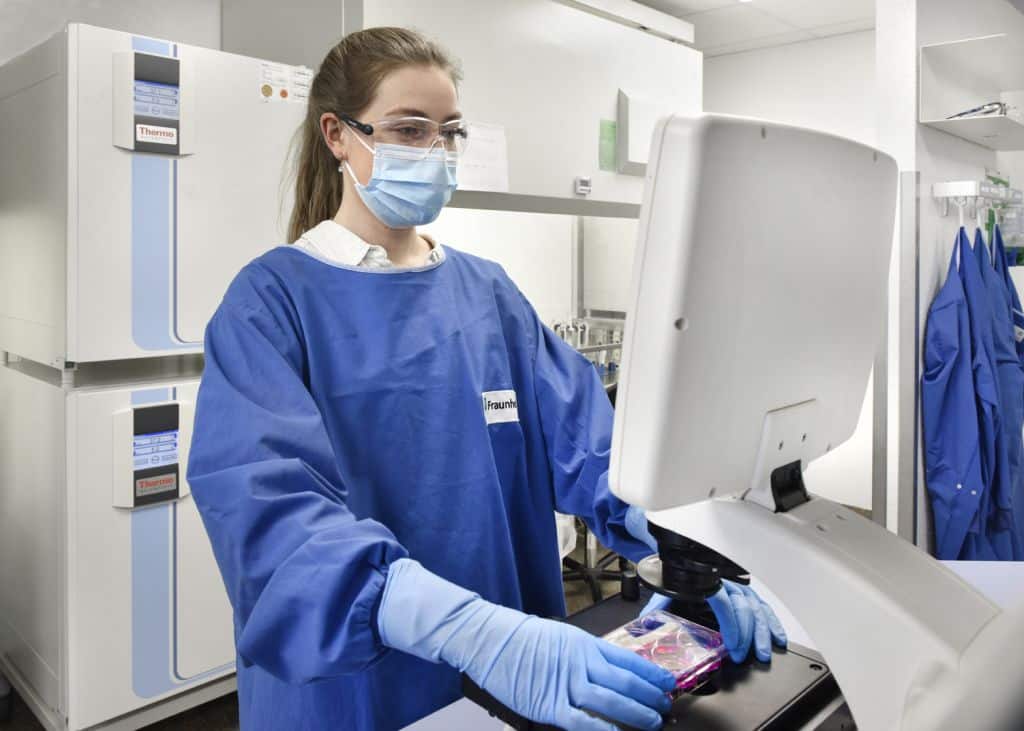Scientists at the Fraunhofer Institute for Translational Medicine and Pharmacology ITMP in Germany are working with partners to develop a new drug class.
Proxidrugs (or proximity-inducing drugs) utilize cells’ waste disposal system as potential new treatments for cancer, infections and Alzheimer’s disease.
Aimo Kannt, head of drug discovery and preclinical research at Fraunhofer ITMP in Frankfurt, is currently researching the new class of drugs with sustained efficacy.
“Traditional drugs work by binding to pathogenic proteins and blocking or inhibiting their function. Proxidrugs, however, destroy the pathogenic protein and therefore have a longer-lasting effect,” Kannt said.
He is convinced proxidrugs will open up new possibilities.
“Eighty percent of all possible protein target structures are inaccessible to current active pharmaceutical ingredients. We could reach many of these using proxidrugs and develop treatments for currently incurable diseases,” Kannt said.
Intensive research in this field is being carried out around the world. The first clinical trials are already under way. However, there is still a long way to go before the new active substances are available to patients as a standard of care.
Addressing the cause of the disease
The inhibitory effect of traditional drugs immediately starts to wear off when the drug is metabolized in the body. Drugs such as antihypertensives must therefore be taken frequently and on a regular basis. Proxidrugs, however, cause degradation of the pathogenic protein and thus eliminate the cause of the disease. To trigger degradation, they utilize proteasomes, the cell’s own protein ‘shredders.’
These are part of a cellular recycling strategy: A biological monitoring system continuously searches for defective proteins. If such a protein is detected, it is flagged by a molecule called ubiquitin. This ubiquitin marker acts as a recognition signal for the proteasome – a barrel-shaped protein complex – which then captures the ubiquitinated protein. Once captured, the unwanted protein is unfolded and broken down into smaller components.
Harnessing the cell’s waste removal system
Proxidrugs cause the disease-related proteins to be marked with an ubiquitin flag. They are thus recognized as waste by the cell’s own waste removal system and degraded by the proteasome.
The ubiquitin flag is attached to the protein by means of a special enzyme, the E3 ligase. Proxidrugs are designed so they can bind to the target protein on the one side and to the E3 ligase on the other. The proximity induced between the target protein and the E3 ligase is what is naming this entire substance class.
“With the PROXIDRUGS project, we are addressing all aspects associated with these types of compounds,” Kannt said.
The consortium consists of 10 partners, including the Goethe University Frankfurt (coordinating institution), the Technical University of Darmstadt, the Max Planck Institute of Biophysics and the pharmaceutical companies Merck and Abbvie.
Three focuses
The project is focusing on three indications: cancer, neurodegenerative diseases and infectious diseases. In all three fields, the aim is to eliminate the proteins that promote disease progression. In the case of cancer, for example, these are messenger substances that cause tumor cells to grow. In the field of neurodegenerative diseases, such as Alzheimer’s disease, the goal is to target proteins involved in the formation of deposits in the central nervous system. Fraunhofer ITMP is taking the lead for this subproject.
New strategy for multidrug-resistant germs
Proxidrugs offer a new approach to fight infectious diseases and to find effective new drugs to tackle multidrug-resistant bacteria. Among others, the project is focusing on Acinetobacter baumannii, a dangerous hospital pathogen that causes, for example, pneumonia and wound infections.
To accelerate the search for effective proxidrugs, Fraunhofer ITMP is working with other partners to develop test systems that can be used to identify potential active substances against the various target proteins.
At the same time and within the framework of the Fraunhofer Cluster of Excellence Immune-Mediated Diseases CIMD, Kannt is also establishing a cross-institute platform for the development of proxidrugs.
The platform is expected to cover the entire value chain, from the search for suitable active substances (drug discovery) to preclinical tests. The focus is on inflammatory bowel diseases and fibrotic lung diseases.
“Proxidrugs seem to be well tolerated and also very effective. This motivates us to work extremely hard on the development of this new drug class,” Kannt concluded.





